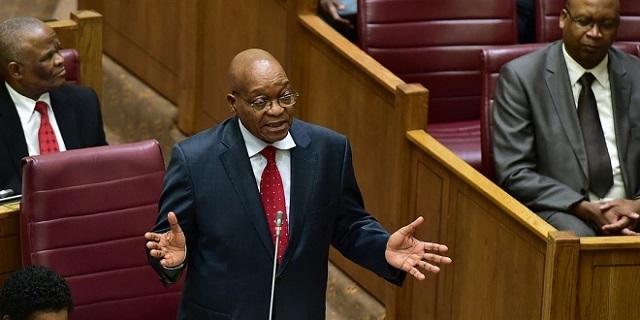
Bloemfontein, South Africa | AFP | South Africa’s embattled president Jacob Zuma goes to court on Thursday in a fresh attempt to fend off the reinstatement of 783 graft charges relating to a 1990s arms deal.
The country’s main opposition party, the Democratic Alliance (DA), has sought in 11 court appearances since 2009 to reactivate the charges over controversial post-apartheid military contracts, which have dogged Zuma for much of his time in government.
In 2005 his former financial advisor Schabir Shaik was convicted for facilitating bribes in exchange for the contracts and sentenced to 15 years in prison. He was later released on medical parole.
The president, who is accused of corruption, fraud, money-laundering and racketeering, has always insisted he is innocent.
– ‘Avoiding being held accountable’ –
Zuma and other government officials were accused of taking kick-backs from the $5 billion (4.2 billion euros) purchase of fighter jets, patrol boats and other arms manufactured by five European firms, including British military equipment maker BAE systems and French company Thales.
Charges were first brought against Zuma in 2005 but dropped by prosecutors in 2009.
However, last year the High Court in Pretoria ruled that he should face the accusations.
This week the Supreme Court of Appeal will hear arguments for and against reinstating the charges.
It will not make a decision for several weeks, by which time the ruling African National Congress (ANC) elective conference will be approaching.
An order reinstating charges could cast a shadow on proceedings — and Zuma’s preferred successor, his ex-wife Nkosazana Dlamini-Zuma.
The case is just the latest in a string of political and legal scandals that have dogged the president but failed to shake his grip on power.
In 2016 Zuma was ordered to repay $24 million (22 million euros) to the public purse for upgrades to his personal residence that judges said showed he had disrespected the constitution.
Institute of Security Studies analyst Gareth Newman believes his chances of success in the Supreme Court are slim.
“The ruling of the High Court was from a full bench of experienced, respected judges who unanimously came to the conclusion that the decision to withdraw the criminal charges against Jacob Zuma was irrational,” Newman told AFP.
“The chance of reaching a different conclusion in the Supreme Court is highly unlikely.
“It’s been a strategy of Jacob Zuma to use taxpayers’ money to avoid being held accountable in court from before even becoming president.”
Zuma has survived numerous bruising court battles over the years, mostly involving graft accusations, as well as calls for him to resign.
He has also faced criticism for sacking two respected finance ministers within two years.
Many South Africans believe those dismissals were linked to his relationship with the wealthy Gupta family, which is regularly accused of exerting undue influence over the president.
– Campaign damage –
Pressure on the president would reach fever pitch if the court reinstates any of the hundreds of charges — particularly if the court rules against Zuma before the ANC party’s conference due in December.
Zuma, 75, is expected to step down as the party president at the end of year, although he will likely remain the country’s head of state until 2019 after which he will not be eligible for re-election.
The party can theoretically replace him before the next general election due in two years time — but with Zuma loyalists occupying many positions of power within the ANC it is unlikely.
It would also be damaging to the president’s ex-wife Dlamini-Zuma, who is seeking to be the next ANC president.
“Currently he is really very, very unpopular… not only among the general public but also among ANC voters,” said Mari Harris, a public affairs expert at Ipsos MORI.
“The repercussions will be more for his ex-wife’s campaign to become the next leader of the ANC. That will really hurt her a lot.”
Zuma is supporting his ex-wife in the belief that she will be able to “protect him from appearing in court”, according to Newman.
James Selfe, the chairman of the opposition DA party, believes Zuma will try to delay the process as much as possible, to avoid prejudicing the ANC’s choice of successor.
“But I do think the Supreme Court will hand down its ruling before December,” said Selfe, who is “optimistic” the charges will be reinstated.
When the charges were dropped in 2009, Zuma was locked in a bitter fight with former president Thabo Mbeki to secure leadership of the ANC.
The withdrawal of the charges cleared the way for Zuma to be elected president just weeks later.
 The Independent Uganda: You get the Truth we Pay the Price
The Independent Uganda: You get the Truth we Pay the Price



